Religion
Burnin’ Vernon, the Easter Bunny hater
April 19, 1981: Fundamentalist minister Vernon Cayten burned a 5-foot stuffed Easter bunny on the front lawn of his church, declaring it was a pagan idol. He also denounced all those who celebrated Easter with Easter Bunnies as "heathens and dummies who worshiped pagan gods."Musician Scott Ryan has since written a song about "Burnin' Vernon." Video below. Lyrics here.

Des Moines Register - Apr 21, 1981
Posted By: Alex - Sun Apr 01, 2018 -
Comments (1)
Category: Holidays, Easter, Religion
Condemn Sunday Picnics
Life in 1898.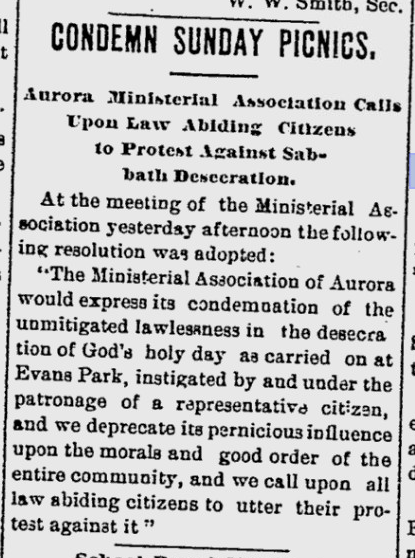
Original article here.
Posted By: Paul - Thu Mar 08, 2018 -
Comments (3)
Category: Antisocial Activities, Authorities and Experts, Culture and Civilization, Food, Nature, Religion, Nineteenth Century
Chairman Jesus
In July 1979, company officials at the Concrete Pipe Corp. in Menasha, Wisconsin decided to elect Jesus Christ as the new chairman of their board. The decision was unanimous.When asked what address they were going to supply to the state for the new chairman, the company president, Don Koepke, explained, "We'll say, 'wherever two or more are gathered in his name.'"
The company had been in existence for 45 years. As far as I can tell, it survived for about another eight years under Jesus's leadership, closing in 1987.
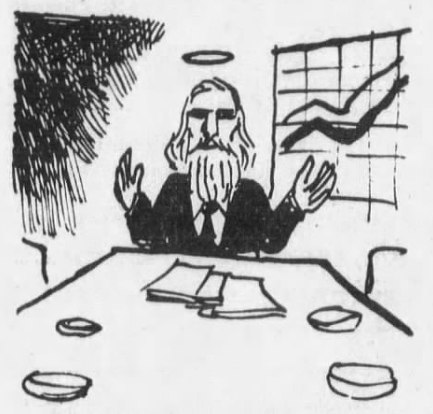
Honolulu Star Bulletin - Oct 6, 1979

Akron Beacon Journal - July 31, 1979
Posted By: Alex - Fri Mar 02, 2018 -
Comments (1)
Category: Business, Religion, 1970s
Pretzels for God
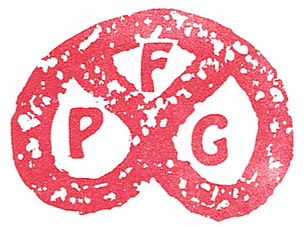
The Pretzels for God movement was founded by Marlene McCauley of Phoenix, Arizona in 1973 after she became inspired to restore the pretzel to what she felt was its rightful place in Christian worship.
Apparently Christians invented pretzels back in the fifth century to eat during Lent since the pretzels contained only water, flour, and salt, but no eggs or milk which were forbidden during the observance. The shape of the pretzel symbolized arms crossed in prayer.
However, in modern times this religious origin has been largely forgotten as pretzels have become a bar and snack food. McCauley was determined to right this wrong. Specifically, she hoped to encourage Christians to eat pretzels during Lent and also to recite before each meal the "pretzel prayer":
More info:
"The Twisting Religious Plot of the Pretzel," Houston Chronicle
"Pretzels for God,"[PDF] text of a speech delivered by McCauley at the National Pretzel Convention in 1974
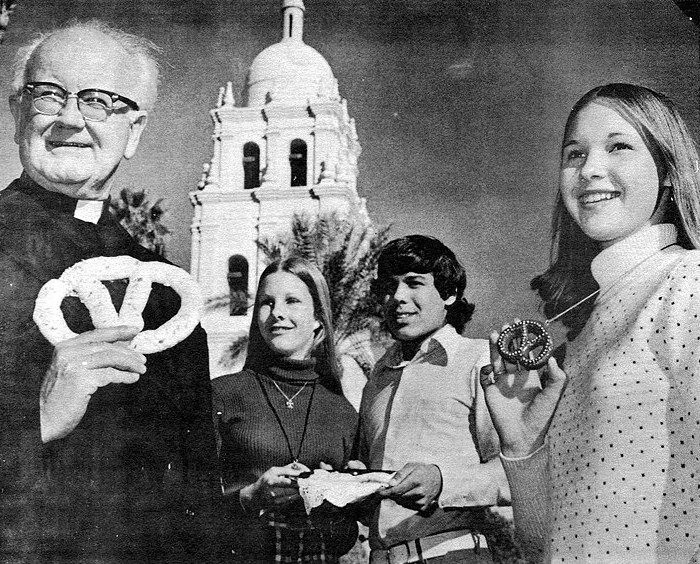
"Rev. Cornelius O'Mara, S.J. holding Lenten Christian symbol of prayer and penance with students from Central High School"

Kane Republican - Feb 23, 1974
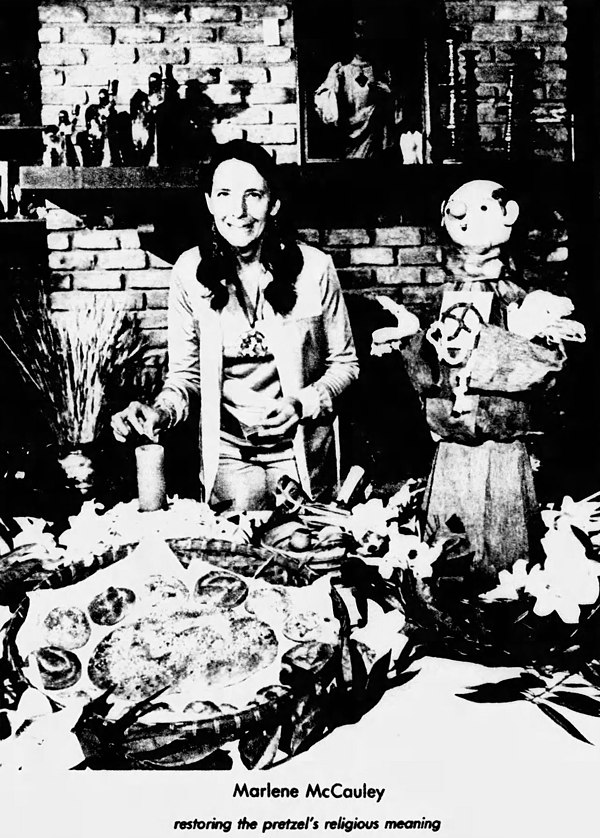
Arizona Republic - Apr 8, 1979
Posted By: Alex - Thu Mar 01, 2018 -
Comments (3)
Category: Food, Junk Food, Religion, 1970s, Arizona
Church of the holy lawn
In 1994, Jeff Goldstein, who described himself as a “semi-active pagan-Jewish minister,” got into trouble with the city of Madison, Wisconsin because he refused to mow his lawn. He claimed that to do so would violate his religious beliefs since he worshipped plants. He said he actually prayed to his lawn, and that to mow it would be a “holocaust against the green creatures.”Goldstein explained that he had formed his beliefs after reading The Secret Life of Plants by Peter Tomkins and Christopher Bird. I’ve read that book. If you like strange science, it’s a good read, full of plant-science weirdness. Though I didn't come away from it believing plants are sacred.
The court didn't buy Goldstein's argument, but I don't know if he ever ended up mowing the lawn.
Seems that Jeff died recently, in 2015. You can read his online obituary here.

Appleton Post-Crescent - Mar 13, 1994

Louisville Courier-Journal - Aug 30, 1994

Jeff Goldstein

Available from Amazon
Posted By: Alex - Fri Feb 23, 2018 -
Comments (7)
Category: Nature, Religion, 1990s
Zhu Bajie, Enlightened Pig Hero

Buddhism is full of weird characters. I thought I knew most of them, but only just encountered Zhu Bajie.
Get your $400 statue here.
Posted By: Paul - Tue Jan 30, 2018 -
Comments (5)
Category: Anthropomorphism, Antisocial Activities, Religion, Statues and Monuments, Asia
Catholic Hipster Handbook
New from Ave Maria Press comes the Catholic Hipster Handbook. According to the publisher's blurb, the book is about "yearning to learn more about the faith by seeking out 'Catholic cool'—overlooked saints, forgotten prayers and feast days, and traditional practices long set aside by mainstream believers."The book sounds interesting. But it reminded me that four years ago I posted about a Catholic ad campaign to promote Jesus as "the original hipster."
So I detect a weird recurring theme: catholics trying to rebrand themselves as hipsters.


Posted By: Alex - Tue Oct 10, 2017 -
Comments (2)
Category: Religion, Books
JFK as Angel
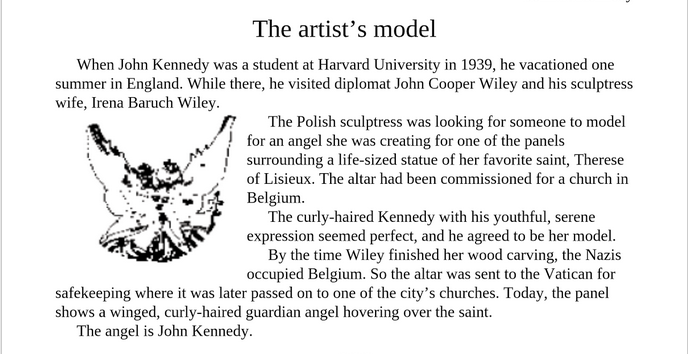
Source of text.
Regretably, the only image I could find has this watermark hiding some of the details.

Posted By: Paul - Wed Aug 09, 2017 -
Comments (4)
Category: Religion, Statues and Monuments, 1930s, 1960s, Europe
Sathya Sai Baba
"Sai Baba's materialisations of vibhuti (holy ash) and other small objects such as rings, necklaces, and watches, along with reports of miraculous healings, resurrections, clairvoyance, bilocation, and alleged omnipotence and omniscience, were a source of both fame and controversy."
Wikipedia page.
Posted By: Paul - Thu May 25, 2017 -
Comments (11)
Category: Cult Figures and Artifacts, Frauds, Cons and Scams, Religion, Superstition, India
Jemima Wilkinson Is Lord

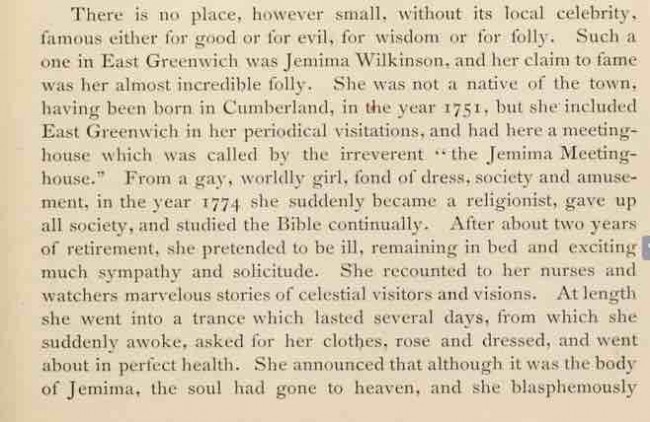
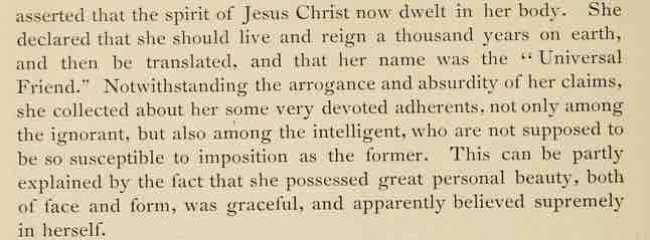
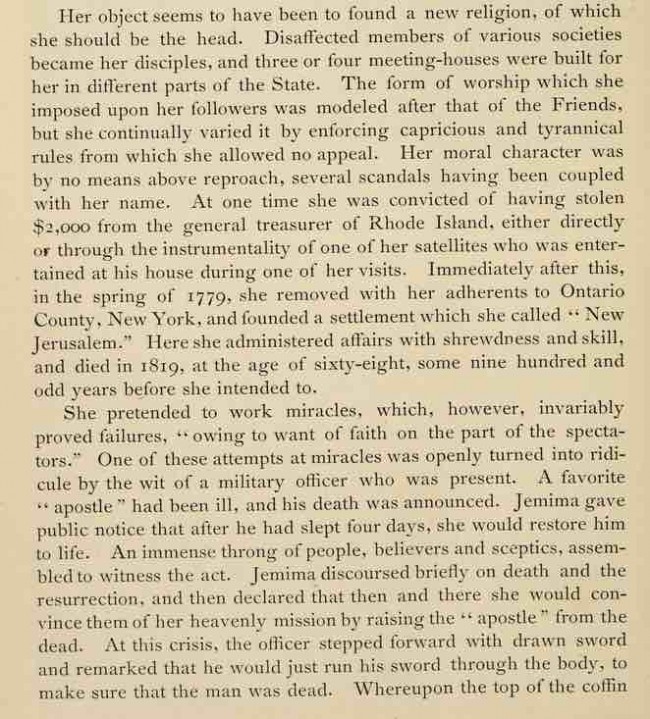

The source.
Posted By: Paul - Sat Jan 28, 2017 -
Comments (2)
Category: Delusions, Fantasies and Other Tricks of the Imagination, Eccentrics, Hoaxes and Imposters and Imitators, Religion, Rituals and Superstitions, Scams, Cons, Rip-offs, and General Larceny, Eighteenth Century

| Who We Are |
|---|
| Alex Boese Alex is the creator and curator of the Museum of Hoaxes. He's also the author of various weird, non-fiction, science-themed books such as Elephants on Acid and Psychedelic Apes. Paul Di Filippo Paul has been paid to put weird ideas into fictional form for over thirty years, in his career as a noted science fiction writer. He has recently begun blogging on many curious topics with three fellow writers at The Inferior 4+1. Contact Us |




